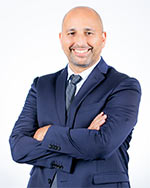Member Highlight: Prof. Mérouane Debbah

Member Highlight: Prof. Mérouane Debbah
Professor at Khalifa University of Science and Technology, Abu Dhabi
 Mérouane Debbah is Professor at Khalifa University of Science and Technology in Abu Dhabi and founding Director of the KU 6G Research Center. He is a frequent keynote speaker at international events in the field of telecommunication and AI.
Mérouane Debbah is Professor at Khalifa University of Science and Technology in Abu Dhabi and founding Director of the KU 6G Research Center. He is a frequent keynote speaker at international events in the field of telecommunication and AI.
His research has been lying at the interface of fundamental mathematics, algorithms, statistics, information and communication sciences with a special focus on random matrix theory and learning algorithms. In the Communication field, he has been at the heart of the development of small cells (4G), Massive MIMO (5G) and Large Intelligent Surfaces (6G) technologies. In the AI field, he is known for his work on Large Language Models, distributed AI systems for networks and semantic communications. He received multiple prestigious distinctions, prizes and best paper awards (more than 40 IEEE best paper awards) for his contributions to both fields and according to research.com is ranked as the best scientist in France in the field of Electronics and Electrical Engineering. He is an IEEE Fellow, a WWRF Fellow, a Eurasip Fellow, an AAIA Fellow, an Institut Louis Bachelier Fellow, an AIIA Fellow and a Membre émérite SEE.
His recent work led to the development of NOOR (upon it release, largest language model in Arabic) released in 2022, Falcon LLM (upon its release, top ranked open source large language model) released in 2023 and the Falcon Foundation in 2024. The Falcon Model Series and The Falcon Foundation have positioned the UAE as a global leader in the generative AI field. He is actually chair of the IEEE Large Generative AI Models in Telecom (GenAINet) Emerging Technology Initiative and a member of the Marconi Prize Selection Advisory Committee.
We approached Prof. Mérouane Debbah to learn more:
Q: Why did you choose to become a faculty in the field of signal processing?
My journey into the field of Signal Processing was influenced by a strong passion for mathematics and its applications in real-world problems. Signal Processing offers a unique blend of theoretical rigor and practical impact, particularly in areas like telecommunications, audio and image processing as well as machine learning. My interests led me to explore random matrix theory, which has profound implications for understanding large systems and complex systems. After spending time in both academia and industry, I realized that my career path was in education and research. As a faculty member, I am committed to training the next generation of engineers and researchers, helping them navigate the complexities of this evolving field while also contributing to significant advancements through my own research.
Q: How does your work affect society?
My research primarily focuses on developing advanced signal processing techniques that enhance communication systems, particularly in wireless environments. Additionally, my work in random matrix theory provides essential insights into the performance limits of these systems. I also aim to integrate intelligent algorithms with signal processing techniques to improve system efficiency and reliability. By enhancing communication technologies, my work has far-reaching implications for society, enabling better connectivity, smarter cities, and more efficient health monitoring systems. Moreover, my collaborations with industry partners ensure that our research translates into practical applications, driving innovation and improving quality of life.
Q: What challenges have you had to face to get to where you are today?
The path to becoming a professor has not been without its challenges. Transitioning between academia and industry required adaptability and continuous learning to keep pace with the rapid developments in technology. Establishing a research group focused on both random matrix theory and AI innovations, while securing funding in a competitive landscape, posed significant hurdles. Balancing teaching responsibilities with research commitments necessitated effective time management and prioritization. However, these challenges have strengthened my commitment to my work, allowing me to grow both personally and professionally.
Q: What advice would you give scientists/engineers in signal processing?
My advice for aspiring scientists and engineers in signal processing is to remain curious and open to learning. The field is constantly evolving with new technologies and methodologies. Engage in interdisciplinary collaboration, as many breakthroughs come from the convergence of different fields, including mathematics and AI. Additionally, do not hesitate to seek mentorship and build professional networks; these relationships can provide invaluable guidance and opportunities. Finally, be persistent and resilient in the face of challenges - innovation often requires taking risks and learning from failures.

